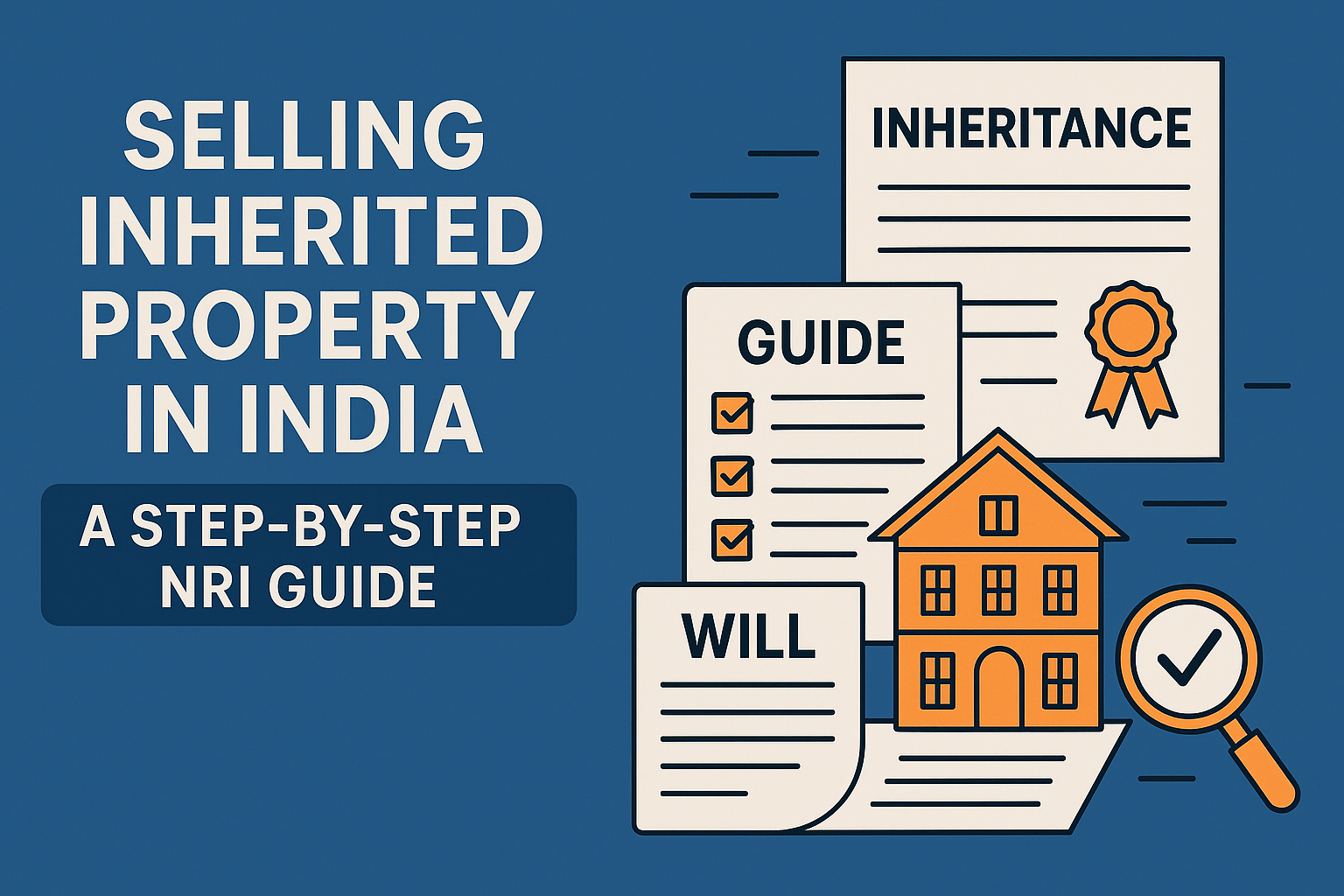Inheriting property in India as an overseas resident involves a unique type of issue. From establishing your legal ownership over the property to tackling repatriation restrictions, the process is about thinking things through and having the right knowledge of Indian inheritance laws and foreign exchange regulations.
Understanding Your Inheritance Status
First, you need to establish your legal ownership prior to selling inherited property. This depends on how the property was transferred to you:
Through a Will
If the property was bequeathed to you under a valid will, you’ll need:
- Original Will: Legally signed document declaring you as a beneficiary
- Death Certificate: Official proof of the previous owner’s death
- Probate Certificate: Court validation of the will (mandatory in some states like Maharashtra, Gujarat, and West Bengal)
The majority of NRIs do not know that probate is mandatory in some Indian states despite a valid will. Attempting to sell without obtaining probate in such locations will lead to rejection during registration
Sunil Verma – Property Law Expert
Without a Will (Intestate Succession)
If your relative passed away intestate, i.e., without a will, succession goes by personal laws based on religion:
- Hindu Succession Act: For Hindus, Buddhists, Jains, and Sikhs
- Indian Succession Act: For Christians and Christians who were married under the Special Marriage Act
- Muslim Personal Law: For Muslims
In this scenario, you’ll require:
- Legal Heir Certificate/Succession Certificate: Certificate stating all legal heirs
- No Objection Certificates (NOCs): From all the other legal heirs if you’re the sole seller
- Family Settlement Deed: When the property is divided among multiple heirs
The Crucial First Steps
1) Transfer the Property to Your Name
The foremost first step is to ensure the property shows your name in all government records.
Mutation of Records: This step, referred to as ‘Dakhil-Kharij’ or ‘Mutation’, places the property in your name in revenue records.
The documents required typically are:
- Death certificate
- Will/Succession certificate
- Your proof of identity and proof of relationship with the deceased
- Property documents (title deed, receipts of tax payments)
Important Note: Mutation does not confer rights to ownership but is required for sale of property, payment of tax, and installation of utilities.
2) Clear Outstanding Liabilities
Before proceeding with the sale:
- Clear all overdue property taxes
- Pay any arrears on bills for utilities
- Pay off any outstanding mortgages or loans charged on the property
- Ensure no legal disputes hover over the property
3) Verify Title Clarity
Conduct a valid title check at least 30 years ago. This typically includes:
- Original sale deed/title document
- Encumbrance certificate (showing that the property is free from legal encumbrances)
- Receipts for property tax
- Land survey reports
The Sale Process: A Step-by-Step Guide
Step 1: Property Valuation
Take a suitable valuation from:
- A registered valuer
- Government-approved valuers
- Trustworthy real estate consultants proficient in local markets
“The valuation has to be realistic. The property cannot be sold for below the circle rate (government-determined minimum value), and an unusually low sale price will attract tax attention.”
Rahul Mehta – Financial Advisor
Step 2: Power of Attorney Considerations
As you’re an NRI, you may have to execute a Power of Attorney (POA) in the event that you cannot physically be present for all sales procedures.
Types to consider:
- Special POA: Limited to some transactions (useful recommendation)
- General POA: Broader powers (exercise judiciously)
Essential POA requirements:
- Must be signed on stamp paper of appropriate value
- Must be attested at the Indian Embassy/Consulate in your current domicile country
- Must be registered at the Sub-Registrar’s office in India where the property is located
Step 3: Finding a Buyer and Agreement to Sell
Once you’ve found a potential buyer:
1) Draw up a comprehensive Agreement to Sell that contains:
- Complete description of the property
- Sale price (consideration)
- Payment schedule
- Possession timetable
- Default clauses
- Details of documents to be furnished
2) Accept a token advance/earnest money (typically 1-2% of property price)
Step 4: Tax Compliance
TDS Requirements
As per Section 195 of the Income Tax Act, in the event of purchasing property from an NRI, TDS at the following rate shall be deducted by the buyer:
- 20% if property was held for more than 24 months
- 30% if held for less than 24 months
NRI Responsibility: Provide PAN information to the buyer and ensure that they deduct the TDS and provide you with Form 16A.
Capital Gains Tax Implications
Long-term Capital Gains: For property held for over 24 months:
- Taxed at 20% after allowing indexation benefits
- Hope of exemption if appropriately reinvested
Short-term Capital Gains: For property held for less than 24 months:
- Taxed at your income tax slab rate
“Most NRIs lose tax exemptions legally available. If you reinvest the capital gains in eligible bonds or another house in India within the time limit, you qualify for exemptions under Sections 54, 54EC, or 54F as per your case.”
Step 5: Registration of Sale Deed
The final step consists of:
- Drawing a sale deed on proper stamp paper (stamp duty varies from state to state)
- Both the parties (or their representatives) coming in front of the Sub-Registrar
- Payment of registration charges (generally 1% of property value)
- Biometric registration
Repatriating the Sale Proceeds
You can repatriate a maximum of USD 1 million in a financial year from sale of inherited property in India as an NRI.
Documents Required for Repatriation
To remit money to your overseas account, your bank will require:
- Form A2
- Form 15CA (online submission)
- Form 15CB (chartered accountant’s certificate)
- Copy of sale deed
- Proof of payment of all taxes due
- PAN card
- Original purchase documents showing the method through which the property was acquired by the person from whom you have inherited
- Inheritance papers (probate/succession certificate)
- Bank statement reflecting sale proceeds credited
Important Repatriation Restrictions
- The USD 1 million year threshold is for the financial year (April-March)
- Money can be remitted only through means of authorized banking channels
- Money can be repatriated only out of an NRO account
- Sale proceeds of agricultural property, plantation houses, or farmhouses cannot be remitted
Special Scenarios and Their Solutions
Multiple Inheritors
When the property is inherited by multiple heirs:
- Consider preparing a family arrangement deed
- Obtain NOCs from all co-heirs in case one of them is selling
- Alternatively, all the heirs can sign a joint sale deed
Property Under Dispute
If the property has disputed claims:
- Clear all disputes before attempting sale
- Want to avail legal mediation
- In complex situations, opt for a declaratory suit from court
Ancestral Property Under HUF
In cases of Hindu Undivided Family properties:
- The head (Karta) needs the consent of all adult coparceners
- A family settlement deed may be required
- Certain tax implications in case of sale of HUF property
Technology-Enabled Solutions for NRIs
Given the challenges of handling a sale of property from overseas, consider:
- Video KYC services for document verification
- Digital signature certificates for remote signing of documents
- Virtual property tours for potential buyers
- Secure online payment gateways for transactions
- Digital document storage solutions
Common Pitfalls and How to Avoid Them
1) Incomplete Mutation
Pitfall: Sale of property without mutation
Solution: Get mutation done in revenue records before starting sale
2) Incorrect Tax Planning
Pitfall: Ignoring tax exemption chances
Solution: Seek guidance from a taxation professional with experience in NRI taxation while finalizing sale
3) FEMA Non-compliance
Pitfall: Violating rules of Foreign Exchange Management Act
Solution: Familiarize yourself with repatriation limits and documentation procedure
4) Inadequate Documentation
Pitfall: Insufficient proof of inheritance
Solution: Complete legal documentation proving your right over the property
The Legal Timeline: What to Expect
Understanding the typical timeline helps in having realistic expectations:
- Obtaining Succession Certificate/Probate: 3-6 months
- Mutation of Property: 1-3 months
- Finding a Buyer: Variable
- Sale Deed Registration: 1-2 weeks
- Tax Compliance Documents: 1-2 months
- Repatriation Processing: 1-2 weeks after all documents
Final Considerations
Emotional Factors
In addition to legal intricacies, selling inherited property also includes an emotional aspect. Keep in mind:
- The emotional significance of ancestral property
- Family dynamics and potential conflicts
- Your long-term relationship with India
Alternative Options
If an outright sale seems intimidating, there are options:
- Leasing the property with professional administration
- Sale in portions if the property is divisible
- Transfer to other relatives in India
Conclusion
Sale of inherited property in India as an NRI is a passage through very complicated legal, tax, and emotional terrain. By following the process step by step – from identifying your rights of inheritance through succession certificates or probate to repatriating funds within the USD 1 million per year limit – you can get through this.
The key is proper planning, accurate documentation, and expert advice from lawyers who are well conversant with Indian property law and laws applicable to NRIs.
With proper planning, even what looks like a complicated procedure can be broken down into small steps, and you can monetize your inherited property in liquid cash while still complying with all legal parameters.
Remember that each case of property and inheritance is unique. While this guide is giving a detailed account, do remember to refer to legal and financial experts handling NRI property cases so that your case can be answered correctly.
Ready for a Stress-Free Property Sale in India?
Don’t navigate these complex legal waters alone. At NRI Property Experts, we specialize in helping Non-Resident Indians sell their properties without the headaches.
Our team of dedicated professionals handles everything from documentation verification to FEMA compliance, ensuring your property sale proceeds smoothly – even from thousands of miles away.
Why Choose NRI Property Experts?
- Complete Legal Compliance – We ensure all regulatory requirements are met
- End-to-End Management – From valuation to final sale proceeds transfer
- Transparent Process – Regular updates at every stage of your property sale
- Specialized NRI Focus – Our team understands the unique challenges you face
Get in Touch Today
- Email: info@nripropertyexperts.com
- Phone/WhatsApp: +447442556797
Or contact us using the form below, and let us handle the complexities while you enjoy peace of mind.


